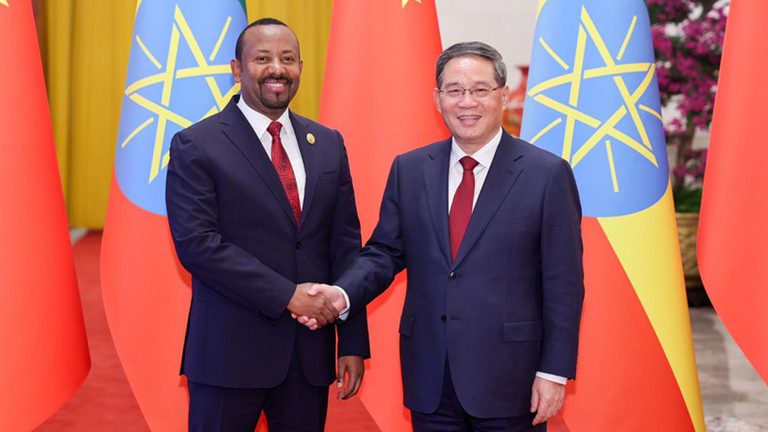Africa
China and Ethiopia concur to intensify their strategic partnership

At the Belt and Road Forum in Beijing, the two nations announced that they had inked 12 agreements for cooperation.
Following a meeting between Chinese President Xi Jinping and Ethiopian Prime Minister Abiy Ahmed on Tuesday, China and Ethiopia declared a “all-weather strategic partnership” to strengthen their bilateral ties.
The third Belt and Road Forum for International collaboration is taking place in Beijing, and the Ethiopian president, who is there, highlighted Ethiopia-China relations as an example of successful “China-Africa and South-South cooperation.”
“We can build on this model to effectively address our current and future development challenges in the new era,” Ahmed said in a statement published on X (formerly Twitter).
Addis Abeba reported earlier on Monday that Ahmed had meetings with Chinese Premier Li Qiang and that the two nations signed 12 agreements of cooperation as a result.
According to a second announcement from the Chinese government, the agreements “cover Belt and Road cooperation, implementation of the Global Development Initiative, agriculture, culture, health, digital economy, green development, and urban and infrastructure construction.”
Li underlined Beijing’s readiness to cooperate with Addis Abeba in order to support shared initiatives to promote domestic stability and growth.
“China stands ready to strengthen cooperation with Ethiopia within such multilateral frameworks as the BRICS mechanism to practise multilateralism, oppose power politics and bullying, and safeguard the common interests of China and Africa as well as international equity and justice,” the official said.
READ ALSO: 25 players have been invited by Ethiopia to compete in the 2024 Olympic qualifier
Ethiopia is expected to join the BRICS in January, which now consists of Brazil, Russia, India, China, and South Africa.
Ahmed stated on Monday that Ethiopia was ready to increase coordination and collaboration with China under the BRICS framework.
Ethiopia, he continued, was ready to actively take part in the Belt and Road Initiative (BRI) and strengthen bilateral ties in a number of areas, including agriculture and building infrastructure.
Chinese firms have developed ports, roads, railroads, power plants, and other infrastructure all over the world as part of the BRI, a plan China began ten years ago in an effort to promote trade and economic development.
For the summit commemorating the tenth anniversary of the BRI, more than a dozen dignitaries from Africa, Asia, and the Middle East arrived in Beijing on Monday.
Among the African leaders who have so far arrived at the forum are Congolese President Denis Sassou Nguesso, Kenyan President William Ruto, and Nigerian Vice President Kashim Shettima.
Ruto declared on Monday that Kenya had signed a memorandum of understanding with Huawei to quicken the East African nation’s digital transformation, even though the conference’s major events aren’t until Wednesday.
